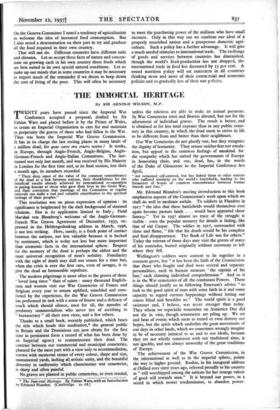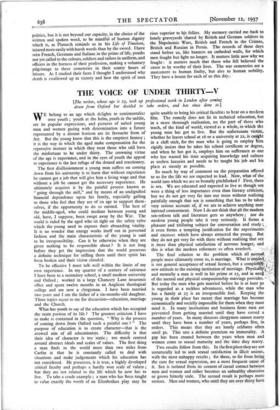THE IMMORTAL HERITAGE
By SIR ARNOLD WILSON, M.P.
TWENTY years have passed since the Imperial War Conference accepted a proposal, drafted by Sir Fabian Ware and placed before it by the Prince of Wales, to create an Imperial Organisation to care for and maintain in perpetuity the graves of those who had fallen in the War. Thus was born the Imperial War Graves Commission. It has in its charge the last resting places in many lands of a million dead, for quae caret ora cruore nostro ? It works, in Europe, through Anglo-French, Anglo-Belgian, Anglo- German-French and Anglo-Italian Committees. The last- named met only last month, and was received by His Majesty in London for the first time and, at its final session, less than a month ago, its members recorded " Their deep sense of the value of the common remembrance of the dead as a link between nations, their thankfulness for the beneficial results already achieved by international co-operation in ,paying honour to those who gave their lives in the Great War, and their conviction that meetings of the Committee at regular intervals can make a real and valuable contribution to the spiritual heritage of their peoples."
This resolution was no pious expression of opinion : its significance is heightened by the dark background of strained relations.. Nor is its application limited to Italy ; Field Marshal von Blomberg's welcome of- the Anglo-German- French War Graves Agreement of December, 1935, ex- pressed in his Heldengedenktag address in March, 1936, is not less striking. Here, surely, is a fresh point of contact between the nations, not less valuable because it is backed by sentiment, which is today not less but more important than economic facts in the international sphere. Respect for the memory of the dead is perhaps the oldest and the most universal recognition of man's nobility. Familiarity with the sight of death may dull our senses for a time but, when the crisis is over the first care, even of savages, is to give the dead an honourable sepulture.
The modern pilgrimage is more often to the graves of those " loved long since " than of saints : many thousand English- men and women visit our War Cemeteries of France and Belgium every year to return uplifted, ennobled and com- forted by the experience, for the War Graves. Commission has performed its task with a sense of fitness and-a delicacy of touch which should silence, once for all, the apostles of predatory commercialism - who never tire of ascribing to " bureaucracy " all their own vices, and a few others.
Thanks to a small book, recently published, which bears the title which heads this meditation,* the general public in Britain and the Dominions can now obtain for the first time in permanent fOrm a record of what has been done by an Imperial agency to commemorate their dead. The contrast between our commercial and municipal cemeteries, planned for the most part with a view only to accommodation, strewn with memorial stones of every colour, shape and size, monumental yards, lacking all artistic unity, and the beautiful diversity in uniformity which characterises war cemeteries, is sharp and often painful.
No graves are planted in public cemeteries, or even tended, * The Inanlrtal Heritage. By Fabian Ware, with an Introduction by Edmund Blunden. (Cambridge. as. Ed.) unless the relatives are able to make an annual payment. In War Cemeteries trees and flowers abound, but not for the adornment of individual graves. The result. is better, and is obtained at far less total expense than in any public ceme- tery in this country, in which the dead seem to strive in life to be different from and better than their neighbours.
Our War Cemeteries do not glorify war, but they recognise the dignity of humanity. They arouse neither fear nor emula- tion, but appeal to the common feelings of mankind. for the sympathy which has united the governments of Europe in honouring their, and our, dead, has, in the words of the Duke of Gloucester to the Imperial Conference last April, " not remained self-centred, but has linked them to other nations who suffered similarly on -the world's battlefields, leading to the formation of bonds of common remembrance between former friends and foes."
Mr. Edmund Blunden's moving introduction to this book emphasises aspects of the Commission's work upon which we shall do well to meditate awhile. To soldiers in Flanders in 1917 " the idea that these battlefields would themselves ever again become pasture lands . . . would have appeared sheer fantasy." Yet in 1937 almost no trace of the struggle is visible : even the popular memory for details is fading, like that of old Caspar. The soldier in 1917, surrounded with slime and flame, " felt that his death would be his complete and final disappearance. The Book of Life was for others." Today the veteran of those days may visit the graves of many of his comrades, buried originally without ceremony or left where they fell.
Wellington's soldiers were content to lie together in a common grave, but " it has been the faith of the Commission that those who fought and died were several and separate personalities, each in human measure ' the captain of his fate,' each claiming individual comprehension." And so it is in the War cemeteries of all the combatant Powers. These things should justify us in following Emerson's advice " to look to the good spirit of man with some faith in it and some capacity to regard current happenings without letting our senses blind and bewilder us." The world spirit is a good swimmer and, I believe, was never stronger than today. They whom we especially remember on Armistice Day did not die in vain, though armaments are piling up. We see and hear of events which seem to retard or even destroy our hopes, but the spirit which underlies the great movements of our days in other lands, which we sometimes wrongly imagine to be of necessity inimical to us and to our ideals, because they are not wholly consistent with our traditional aims, is not ignoble, and not always unworthy of the great traditions of Europe.
The achievement of the War Graves Commission, in the international as well as in the imperial sphere, points the way to higher ground. Ruskin, in his inaugural address at Oxford over sixty years ago, referred proudly to his country as " still worshipped among the nations for her strange valour of good will towards men." It is beyond our power, in a world in which power predominates, to abandon power- politics, but it is not beyond our capacity, in the choice of the written and spoken word, to be mindful of human dignity which is, as Plutarch reminds us in his Life of Timoleon, injured more easily with harsh words than by the sword. I have seen French, Germans and Italians in the prime of life, youths not yet called to the colours, soldiers and sailors in uniform, and officers in the harness of their profession, making a voluntary pilgrimage to these cemeteries in their scanty hours of leisure. As I studied their faces I thought I understood why death is swallowed up in victory and how the spirit of man rises superior to his follies. My memory carried me back to lonely graveyards 'shared by British and German soldiers in the Napoleonic Wars, British and French in the Crimea, British and Russian in Persia. The records of those days stand before us, like banners on cathedral walls, for which men fought but fight no longer. It matters little now why we fought : it matters much that those who fell believed the cause to be worthy of their lives. The war cemeteries are a monument to human frailty, but also to human nobility. They have a lesson for each of us this day.















































 Previous page
Previous page